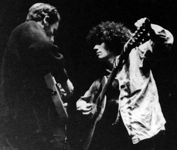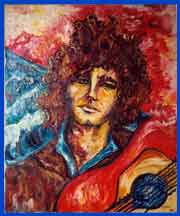WERE WE CRAZY?
(Written in mid-80s)

Tim Buckley and I were close friends. He was the singer, songwriter, and star. I played lead guitar. In some of his lighter moods, he joked and said he was just the lead vocalist in my band. We enjoyed each other's company. Buddies. Soulmates.
Jainie Goldstein was his girlfriend, a kind, warm-hearted young woman, gutsy, courageous. She handled practical matters. Protected Tim from bad guys and aggressive groupies. A God-sent Jewish mama. Friend of his, friend of mine.
She was only 21 or so when she dropped by my place in Venice, California, one day back in 1969. As we talked, she looked at me quizzically, lost in thought, almost speaking to herself.
"How does anybody know if they're crazy?" she said. "Even if you are crazy, it still feels real, doesn't it? Don't we always think we're seeing things clearly? Maybe we're completely lost in a fantasy world, acting and reacting in terms of things we project ourselves — all the stuff we do around here — getting drunk, stoned on reds, the things we think about, the way we react to failure, success. Maybe everything we do is a warped projection of our own bizarre minds. And yet we feel sane, don't we? What do you think — can people be crazy and not know it?"
Blew me away.
At parties, on the road, motels, concerts, bars — we bragged about being crazy. That meant we believed we weren't psychoanalytically and certifiably out of our minds. We weren't neurotically self-destructive losers, not really. We weren't that.
Were we?
No way, Jose. We were outlaw individualists, brilliant, adventurous, creative. It was only our strengths and gifts that threw us out of sync with the mainstream. We weren't truly crazy. We were talented.
Our egos loved it. We didn't fit because we were so great.
Today, I weep for us. We were just young, sad, lost souls, doing the best we could. Trying to love ourselves and other people, giving music to the world, wanting to be loved in return. To our great credit, we dedicated ourselves to the highest ideal — service to music. In every way, we meant well, and played and lived as well as we could. We were but innocent lambs, crippled in our psyches, trying hard to live up to the best in ourselves. It was like trying to run touchdowns with our shoes tied together. Not impossible, but extremely difficult.
We turned everything around. We weren't uninformed or unaware—"they" were. We were innovators, evolving from one level to another through music, and in many ways that was true. Others, however, were the They-people: donkeys, nerds, dweeps. Especially musicians who were conventional by nature. Double-especially if they were commercially successful: sell-outs, mediocrities, hustlers, corporate dupes.
Some people can live with themselves and others in gentle, loving ways. Not us. To our minds, people who enjoyed healthy, caring relationships could do so only because they were lobotomized. We called straight folks "Lobos." Sang in the car, "Lo-bo, Lo-bo, Lo-bo-bo-bot-o-mie."
We didn't know it, but success terrified us. On the surface, we felt brilliant. Deep down, we felt absolutely worthless. Our parents surely meant well, but they had their own hang-ups, God knows. They passed them on and couldn't help it. Because of their own unconscious sufferings, they violated our psyches in turn, brutalized our individuality, threw us into the world almost surely incapable of surviving beyond our youth.
Once we'd been bought and sold as novelties, there was no place left to go. But we didn't know that. Invincible/worthless, superior/inferior, brilliant/stupid, talented/deluded. A civil war raged inside our heads, psychic ping-pong.
When even the possibility of success came our way, it frightened us to the core. Divided within, tormented by confusion and inadequacy, we killed success by killing ourselves. As losers, we felt comfortable. Superiority without demands. A sad reality.
I felt that way and often knew it. Later, in psychotherapy, I learned that Tim felt that way too. Behind his eyes, beneath his words and conscious thoughts, he felt small, inadequate, desperately in need of strength, competence, power. Hence, the narcissism. Hence, the drugs and booze. Hence, the efforts to dominate everybody and every situation he encountered.

His dynamics were similar to mine, but he had to bear by far the greater burdens. For me, it was easy — on stage playing guitar in fabulous cities, New York, LA, Atlanta, Boston, London, Copenhagen, Frankfurt. Playing freely, basking in Tim's reflected glory, earning a little glory of my own. I didn't have to shoulder the spotlight. He did. I didn't have to carry the expectations, the scrutiny and evaluations, the criticisms. He did.
In later years he endured too much criticism from the public, beginning with his avant-garde music, continuing into his final funk-rock phase. It got to be just too much. That accumulated lack of respect was a significant part of what drove him to the booze and heroin that killed him. He felt inadequate and wounded in every way. According to some of his songs, he was shifting in his love life too. That created a whole other batch of problems. He carried a heavy load.
But in those earlier years, what could we do? What about Jainie's question? We were crazy. Unconscious, driven by self-destructive urges, we visited passion-zones only the intoxicated know.
In fear and pride, in glory and self-loathing, we played our music, giving everything we had. We laughed and cried. We lived by the sea in Venice, made love with our women, swam in the ocean, toured America, Europe, played on radio, television, in concert halls. Tim was at the height of his popularity. We were young and famous, adored. We felt immortal.
That part was great. Some of the best times I ever had. Never in the years since then have I known such ecstasies. I will not deny our happy/sad experiences. I'll never say our lives "weren't real."
As Tim once said, "Everything is real."
Including neurotic delusions?



